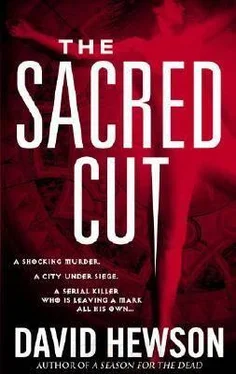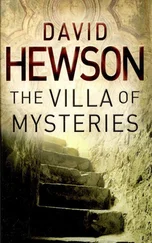She was trying to remember something. Costa waited, knowing he couldn’t let this interview run and run, wondering whether there were any other avenues left open to him.
“And?”
“They were solitary creatures,” she said testily. “Not the kind you could talk to easily in the street.”
“All of them?”
“Most.”
“Do you remember any names? It’s possible this man who was attacked was mistaken for someone else.”
“So many,” she said, frowning.
Even the old ones didn’t try much these days. Costa took out his card and gave it to her, pointing out the mobile number.
“If you think of anything. I was probably mistaken in any case. If these men were only here for a short time… I was hoping there was someone who stayed there longer. Some years ago. A man, perhaps, who regarded it as his home.”
The old eyes sparkled. “There was one. Ten, fifteen years ago. I recall now. I think he stayed there for a year. Possibly more.”
“His name?”
“Even less talkative than most of them, from what I remember. Somewhat abrupt I thought, but perhaps that was just his manner.”
“His name?” he insisted.
She shook her head. “How could I possibly know that?”
Teresa had checked. If Number Thirteen was a normal rental property there would be residency records. None existed. It was a bolt-hole for one of the American agencies, surely. They would have a way around all the regulations ordinary citizens had to face.
“I may have a photograph, though,” she added brightly. “Would that help?” She nodded at the gleaming walnut sideboard next to him. It was covered in small, mounted pictures. She passed him one. “You know what time of year that is?”
It was winter. Men, women and children, all in heavy coats, stood in front of the fountain of the tortoises holding lit candles.
“No.”
“Shame on you! Have you never heard of Hanukkah? Why should the Catholics steal all the fun for Christmas?”
“I’m sorry. I’m not a Catholic.”
“How shocking,” she said with a laugh. “Still, I forgive you. We have a little tradition. Every year we take a photograph of ourselves. Just the people living here. By the fountain. Every year. I can show you ones when I was a young girl before the war.” Her eyes twinkled. “You wouldn’t recognize me. I wasn’t the old thing I am now.”
Costa’s brain was working overtime. “He was in the photograph? This American?”
“He didn’t want to be! The poor man was walking home just as we were lining up out there. We insisted. A little vino had been drunk, you understand. He didn’t have a choice.” She paused to let this point go home. “We can be very persuasive when we want to be, you know.”
“I can believe that. When?”
She frowned. “I really couldn’t say. I’ve so many photographs.”
“Possibly ten, fifteen years ago?”
She crossed the room, picked up a couple of photos, took off her glasses to peer at them, then returned with one in her frail hand and passed it to him. Costa scanned the faces there. He looked at the back. There was a year, scribbled in pencil: 1990 .
Bingo.
“YOU WANT TO KNOW who Bill Kaspar is?”
Joel Leapman looked like a man speaking from personal experience, and there was something in his eyes-impending pleasure, or a hint of a nasty surprise around the corner-that Gianni Peroni really didn’t like.
“OK. I’ll tell you. Kind of a soldier. Kind of a spy. A mercenary. A go-between running shuttle between men who, like Kaspar, didn’t really exist either. One of the best. Take it from me. He was the sort of guy you’d follow anywhere, right into hell if that’s where he wanted to go. An American hero, we thought. Not that anyone would ever call him that out loud, you understand. And now we’re going to hang him out to dry. Life’s a bitch sometimes.”
Leapman’s tale confirmed just about everything Emily Deacon had discovered. Back in 1990, William F. Kaspar had been called to lead one of two covert teams into Iraq on an intelligence mission well behind hostile lines. The venture was a disaster. The day after they arrived to establish a forward base inside an ancient monument outside Babylon, the Republican Guard had attacked in force. Dan Deacon was out on patrol with his own team when it happened. Deacon radioed for assistance and was ordered not to engage. Forty-five minutes later, two Black Hawks, backed by fighter support, arrived on the scene. The ziggurat was a smoking shell. From what surveillance could see, Kaspar and his team were dead. Deacon’s crew managed to escape to a deserted farm two miles away, where a helicopter snatched them from the approaching enemy, though one female member was badly wounded along the way.
The mission didn’t exist. The combatants, as far as their relatives were concerned, remained incommunicado on private training exercises in the Gulf until, two months later, an army captain visited their homes with stories of dead heroes in the real conflict, which was now under way. There could be no medals, no public mourning. Not even a private Purple Heart. None of them was officially in the military. Dead spooks wear no honours.
Wars make noise. In the tumult of the conflict the loss of nine unknown, unseen individuals made little impact. Money went around to keep families and others quiet. The men and women who survived went back to their jobs, in the diplomatic and intelligence services, and in civilian life too. They kept their secrets, they got on with their lives. The battle was won. Saddam went home, leaving a trail of corpses in his wake, claiming victory. And Kuwait was free beneath the smoke of burning oil fields.
All in all, Leapman said, the verdict was that the war was half a job well done. There were people who thought they should have gone all the way into Saddam’s palaces in Baghdad. But that wasn’t part of the UN brief, and military people lived by UN briefs back then. The objective had been to recover Kuwait and hope that Saddam learned his lesson. They got part of what they wanted.
He took a swig of the bottle of water he’d brought with him and stared at each of them in turn.
“You get all that for free,” Leapman said. “It’s history now, anyway, and who gives a shit? What comes next, though, is different. If this goes public, then everything goes way over our heads, gentlemen. It won’t be me or Viale here who’s screaming blue murder. It’ll be bureau chiefs and generals or worse and none of us wants that. Understood?”
Peroni found himself nodding automatically, as if he had a choice.
What happened next, Leapman said, was they realized Baghdad had got insight. Postwar, someone somewhere was helping Saddam.
“Helping him how?” Falcone demanded.
“Background,” Leapman answered. “It was a question of adding things up and working out what didn’t make sense. There were sanctions in place by then. Tough sanctions, ones that worked, as well as sanctions can, anyway. All the same, we knew Saddam was getting wind of things he shouldn’t. He understood some of our military hardware better than he ought. He took out three Iraqis we’d placed near him to keep an eye on what was going on. He had intelligence, stuff he wasn’t supposed to know. So we had to ask ourselves what was going on.”
“Kaspar?” Peroni wondered. “I thought you said he was a hero.”
“Yeah. I also said he was dead. Great cover twice over, huh? We went back and talked to people in Deacon’s team again. They were uncomfortable about it. I guess if you go through that kind of experience, you don’t want to think ill of your comrades. But a couple of them, Deacon included, had their suspicions. Or so they said after a lot of prompting. Don’t forget, at that stage we thought Kaspar was blown away along with the rest of his team. But maybe that was what we were supposed to believe. And all the while he was living the good life in some quiet palace out in the desert, counting his money, gradually spilling out every last thing he knew, while Saddam lapped it up. So if that’s true, what do you do?”
Читать дальше










